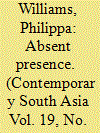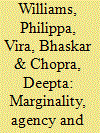| Srl | Item |
| 1 |
ID:
107221


|
|
|
|
|
| Publication |
2011.
|
| Summary/Abstract |
This paper examines the everyday experiences and perspectives of Muslim Ansa-ris (weavers) in urban north India with respect to the 'welfare state'. The case of a recent health insurance scheme, initiated by the Indian government, constitutes the paper's focus. Narratives around the scheme expressed by residents in a majority Muslim mohalla- (neighbourhood) in Varanasi illustrate the ways in which the state's presence was more often experienced through its perceived absence and inaccessibility. But even whilst such experiences represented broader patterns of neglect, locally interpreted as the upshot of being India's largest religious minority, this community was not stricken by a sense of absolute alienation and nor did individual or collective actions exhibit outright disaffection towards the state. More appropriately, 'defensive agencies' informed by degrees of pragmatism, acceptance and resilience, were articulated in an effort to protect, as well as improve the future capacities and ambitions of the neighbourhood residents where the state had seemingly failed. The paper concludes however with a word of caution about celebrating such agency, and reflects on the potential for transformative politics by Muslims in urban India.
|
|
|
|
|
|
|
|
|
|
|
|
|
|
|
|
| 2 |
ID:
107223


|
|
|
|
|
| Publication |
2011.
|
| Summary/Abstract |
This paper examines perceptions of the state by urban Muslim artisans in India. Through ethnographic analysis, I focus on the life and work trajectories of two artisans whose perceptions and experiences of the state differ widely. The common thread running through each artisan's experience is that their engagement or disengagement with the state produces subjectivities that are both deemed authentic. One artisan's involvement with the state serves to authenticate not only her skills and craftsmanship but also her sense of self, while another artisan's refusal to engage with the state authenticates his work and sense of self because of his experience of the state as corrupt. I am particularly interested in how state-issued documents, such as the certificate conferred to winners of the national awards for highly skilled artisans and the artisan identification card, are perceived as legitimate or illegitimate based on ideals of what it means to be an authentic artisan. This paper also examines how conceptualizations of the margins through the medium of documents can provide alternate ways of understanding experiences of the state.
|
|
|
|
|
|
|
|
|
|
|
|
|
|
|
|
| 3 |
ID:
103170


|
|
|
|
|
| Publication |
2011.
|
| Summary/Abstract |
The idea of the state has shown remarkable resilience over the last couple of decades, despite assaults on it from neoliberal doctrines and the forces of globalization. During this period, the abiding presence and role of the state has been particularly evident in the contemporary political life of the Asia Pacific region. This article pays special attention to the contemporary Indian state in the context of development. It reflects upon the ways in which the state is experienced, by focusing on questions of marginality, agency and power as they intersect the politics of development. By reading the empirical insights documented within this special issue against a rich trajectory of scholarship on the Indian state, the article argues that there has been a recent qualitative change in the way in which the contemporary Congress-led UPA government has presented itself to the common person. The implementation of pro-poor and more inclusive policies has altered the discursive landscape within which state-society interactions have taken place over the last five years. Importantly, these policies have functioned to reconfigure not only the material interactions between the state and India's marginalized, but also the imagined spaces within which marginal groups renegotiate their relationships with the state.
|
|
|
|
|
|
|
|
|
|
|
|
|
|
|
|